|
|
 |
Fiche d'espèce de Copépode |
|
|
Calanoida ( Ordre ) |
|
|
|
Lucicutiidae ( Famille ) |
|
|
|
Lucicutia ( Genre ) |
|
|
| |
Lucicutia macrocera Sars, 1920 (F,M) | |
| | | | | | | Syn.: | Lucicutia magna : Wilson, 1932 a (p.130, fig.M, non F);
? Lucicutia pacifica Brodsky, 1950 (1967) (p.329, figs.F,M); Hülsemann, 1966 (p.733, fig.M); Minoda, 1971 (p.37); Morioka, 1972 a (p.314); Hattori, 1991 (tab.1, Appendix); Chihara & Murano, 1997 (p.830: tab.5); Suarez-Morales & Gasca, 1998 a (p.110); Yamaguchi & al., 2002 (p.1007, tab.1); Hernandez-Trujillo & Esqueda-Escargera, 2002 (in Appendix); Boxshall & Halsey, 2004 (p.133: F; 135: M); Ikeda & al., 2006 (p.1791, Table 2); Homma & Yamaguchi, 2010 (p.965, Table 2); Homma & al., 2011 (p.29, Table 2, abundance, feeding pattern: suspension feeders); in CalCOFI regional list (MDO, Nov. 2013; M. Ohman, comm. pers.) | | | | Ref.: | | | Sars, 1920 c (p.20, Rem.F); 1925 (p.213, figs.F,M); Rose, 1933 a (p.195, figs.F,M); Jespersen, 1934 (p.105); 1940 (p.52); Vervoort, 1957 (p.130, figs.F,M); Tanaka, 1963 (p.34, figs.F, Rem.); Hülsemann, 1966 (p.725, fig.M); Arashkevich, 1969 (p.703, figs.F); Bradford, 1971 b (p.24, fig.M); Heptner, 1971 (p.134, figs.F,M, Rem.); Séret, 1979 (p.142, figs.F); Razouls, 1994 (p.153, figs.F,M); Bradford-Grieve & al., 1999 (p.883, 945, figs.F,M); Bradford-Grieve,1999 b (p.104, figs.F,M, Rem., figs.177, 191); Boxshall & Halsey, 2004 (p.133: F; p.135: M) | 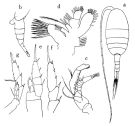 issued from : O. Tanaka in Publs Seto Mar. Biol. Lab., 1963, XI (1). [p.35, Fig.164]. Female: a, habitus (dorsal); b, urosome (left lateral side); c, A2; d, Mx1; e, P1; f, exopod of P2; g, P5. Nota: The urosome segments and furca are in the proportional lengths as 30:10:12:16:32 = 100.
|
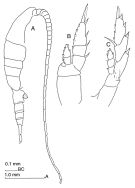 issued from : J.M. Bradford-Grieve in The Marine Fauna of New Zealand: Pelagic Calanoid Copepoda. National Institute of Water and Atmospheric Research (NIWA). NIWA Biodiversity Memoir, 111, 1999. [p.105, Fig.69]. Female (from 34°32.5'S, 157°31.5'E): habitus (lateral right side); B, P1; C, P5. Nota: The single Southwest Pacific specimen has female P5 less slender than that figured by Sars (1924); exopod segment 3 is 2.1 times the length of the terminal spine.
|
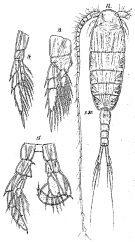 Issued from : G.O. Sars in Résult. Camp. Scient. Prince Albert I, 69, pls.1-127 (1924). [Pl.LVII, figs.12-15]. Female (48°24'N, 18°18'W): 12, habitus (dorsal); 13, P1; 14, P5. Male: 15, P5.
|
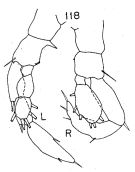 Issued from : K. Hülsemann in Bull. Mar. Sc., 1966, 16 (4). [p.728, Fig.106]. Male (after Vervoort, 1957): 106, P5. L = left leg; R = right leg.
|
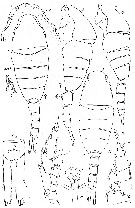 issued from : M.V. Heptner in Trudy. Inst. Okeanol., 1971, 92. [p.135, Fig., 1-6, 8-11]. Female (from Kuril-Kamchatka Trench. pbs I, spine-like on outer margin on basis of P1. Male.
|
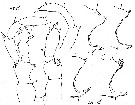 issued from : M.V. Heptner in Trudy. Inst. Okeanol., 1971, 92. [p.136, Fig.31]. Male. pbs V, basis of left P5 with acute process at the base and row of spinous processes around inner distal angle.
|
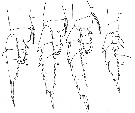 issued from : W. Vervoort in B.A.N.Z. Antarctic Reseach Expedition, Report-Ser. B, Vol. III, 1957 [Fig.118]. Female (from 64°55S, 54°35'E): a, right P1 (anterior); b-d, P2 to P4 (left legs, posterior).
|
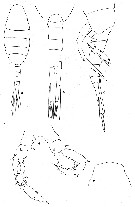 issued from : W. Vervoort in B.A.N.Z. Antarctic Reseach Expedition, Report-Ser. B, Vol. III, 1957 [Fig.119]. Male (from 65°08'S, 80°58'E): a, habitus (dorsal); b, posterior part cephalothorax and urosome (dorsal); c, idem (lateral); d, P5 (rt = right leg; lt = left leg); e, forehead (dorsal).
|
 Lucicutia macrocera Lucicutia macrocera female: 1 - Characters following not combined : Prosome about 3 times longer than urosome. Cephalosome with slightly projecting and rounded anterior corners and well developed lateral spinous projections; anal somite about as long as wide; caudal rami 11.7 times longer than wide and bowed outwards at base, leaving elliptical space between rami proximally. 2 - P1 with 2-segmented endopod. 3 - Cephalosome not with 2 pairs of lateral spinous projections, but with other forms. 4 - Distal 6 to 7 segments of A1 reaching beyond tip of caudal ramus.
|
 Lucicutia macrocera Lucicutia macrocera male: 1 - P1 with 2-segmented endopod; 2 - Caudal rami less than 10 times longer than wide. 3 - Inner distal corner of basis of P5 without strong spine. 4 - Inner proximal corner of basis of left P5 with 1 spine-like process; inner distal corner of basis with small teeth.
|
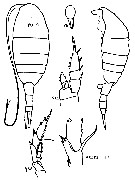 Issued from : K.A. Brodskii in Calanoida of the Far Eastern Seas and Polar Basin of the USSR. Opred. Fauna SSSR, 1950, 35 (Israel Program for Scientific Translations, Jerusalem, 1967, p.330, Fig.228). As Lucicutia pacifica. Female (from NW Pacific): habitus (dorsal and lateral left side); R, rostrum (frontal view); S1, P1; S5, P5; S5 E2and 3, exopodal segments 2 and 3 of P5 (enlarged). Nota : Head very convex (lateral view) at the junction with thorax, latter site marked by depression, behind which follows an protuberance. Rostrum with 2 short thick filaments, defined from the base. A1 exceeding body length by 4 distal segments Urosome one and three fourth times in length of cephalothorax. Genital segment equal to combined length of 2nd and 3rd segments plus one half of anal segment. Left caudal ramus slightly longer than the right ; rami very slightly longer than 2nd, 3rd and 4th segments combined ; right ramus 5.5 times, left one 7 times longer than wide. P5 with 2-segmented endopodite ; 2nd segment of exopodite bearing slightly curved, terminally pinnate inner bristle.
|
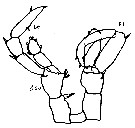 Issued from : K.A. Brodskii in Calanoida of the Far Eastern Seas and Polar Basin of the USSR. Opred. Fauna SSSR, 1950, 35 (Israel Program for Scientific Translations, Jerusalem, 1967, p.330, Fig.228). As Lucicutia pacifica. Male (from NW Pacific): S5, P5. Le = left side; Ri = right side. Nota : Left A1 geniculate, exceeding body length by 1.5 distal segments. Left P5 with inner distal margin of coxa bearing large spine, inner protuberance of basis armed with bundle of 5 curved spines.
|
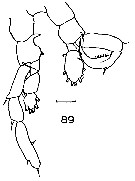 Issued from : J.M. Bradford in N.Z. Oceanogr. Inst., 1971, 206, Part 8, No 59. [p.24, Fig.89] Male (from 75°09'S, 171°00'W): 89, P5.
|
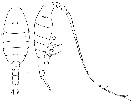 Issued from : C. Séret in Thesis 3ème Cycle, UPMC, Paris 6. 1979 [Pl.XXXVII, Figs.241, 242]. Female (from 56°S, 70°E): 241, habitus (dorsal); 242, same (lateral). Nota: Caudal rami 6 times longer than wide. Endopodite of P1 with 2 segments. A1 exceeding caudal rami by 7 segments
|
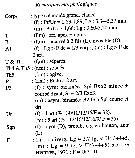 Issued from : C. Razouls in Ann. Inst. océanogr., Paris, 1994, 70 (1). [p.153]. Caractéristiques morphologiques de Lucicutia macrocera femelle et mâle adultes. Terminologie et abbréviations: voir à Calanus propinquus.
| | | | | Ref. compl.: | | | Sewell, 1948 (p.503); C.B. Wilson, 1950 (p.256); Björnberg, 1973 (p.343, 387); Deevey & Brooks, 1977 (p.256, tab.2, Station "S"); Hopkins, 1985 (p.197, Table 1, gut contents); Hopkins & Torres, 1988 (tab.1); Voronina & Kolosova, 1999 (p.71); Razouls & al., 2000 (p.343, tab. 5, Appendix); Schnack-Schiel & al., 2008 (p.1045: Tab.2); Gaard & al., 2008 (p.59, Table 1, N Mid-Atlantic Ridge); Park & Ferrari, 2009 (p.143, Table 4, Appendix 1, biogeography) | | | | NZ: | 13 + 1 douteuse | | |
|
Carte de distribution de Lucicutia macrocera par zones géographiques
|
| | | | | | | | | 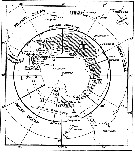 issued from : W. Vervoort in B.A.N.Z. Antarctic Reseach Expedition, Reports - Ser. B, Vol. III, 1957 [Fig.120] issued from : W. Vervoort in B.A.N.Z. Antarctic Reseach Expedition, Reports - Ser. B, Vol. III, 1957 [Fig.120]
Chart showing the geographical distribution (white circle) in the seas surrounding the Antarctic continent.
Nota: In this chart the area frequented by whaling vessels has been hatched. The Antarctic circle (66°.5 S) has been drawn as a broken line. The numbers I to VI refer to the sectors into which the Antarctic seas are divided according to Mackintosh (1942) (after Vervoort, 1951). |
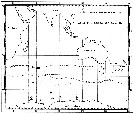 Issued from : C. Séret in Thesis 3ème Cycle, UPMC, Paris 6. 1979, Annexe. [p.46]. Issued from : C. Séret in Thesis 3ème Cycle, UPMC, Paris 6. 1979, Annexe. [p.46].
Geographical occurrences of Lucicutia macrocera in the Indian Ocean and Antarctic zone. [after publications from: Brady, 1883, 1918; Thompson, 1900; Wolfenden, 1908, 1911; With , 1915; Rosendorn, 1917; Farran, 1929; Sewell, 1929, 1947; Brady & Gunther, 1935; Steuer, 1929, 1392, 1933; Ommaney, 1936; Vervoort, 1957; Tanaka, 1960; Brodsky, 1964; Seno, 1966; Andrews, 1966; Grice & Hulsemann, 1967; Seno, 1966; Frost & Fleminger, 1968; Voronina, 1970; Zverva, 1972].
Nota: C. Séret notes the occurrence at the station 56°S, 70°E. |
| | | | Loc: | | | Antarct. (Peninsula, Weddell Sea, Indian, Pacif. (SW), sub-Antarct. (S Tasmania, S Kerguelen Is.), Namibia, W Bretagne, off Bermuda (Station "S"), Sargasso Sea, Woods Hole, S Strait of Davis, S Iceland, Indian, Philippines, Japan (Sagami Bay, off Sanriku), off SE Hokkaido, Station Knot, W Pacif., Kuril-Kamchatka, Okhotsk Sea, Bering Sea (S Aleutian Basin), ? W Baja California, N Chile (in Björnberg, 1973), Tasman Sea | | | | N: | 27 | | | | Lg.: | | | (1) F: 3,3; (22) F: 5-4,9; M: 4; (23) F: 5,37-4,7; M: 5,2-4,84; (25) F: 4,05-3,69; M: 4,28-3,78; (26) F: 3,34; (45) M: 3,54; (102) M: 3,8; (208) M: 4,4; (246) F: 3,61; (909) F: 3,4; {F: 3,30-5,37; M: 3,54-5,20}.
Body size: F: 3,3 - 4,05 (Sars, 1925; Vervoort, 1957; Tanaka, 1963; Wilson, 1932a; Séret, 1966; Bradford-Grieve, 1999b)
Body size: F: 4,70 - 5,00 (Brodsky, 1950; Heptner, 1969)
| | | | Rem.: | méso & bathypélagique.
Sampling depth (Antarct., sub-Antarct.) : 500-1000 m.
Un doute subsiste sur la synonymie de Lucicutia pacifica.
Voir aussi les remarques en anglais | | | Dernière mise à jour : 29/01/2017 | |
|
|
 Toute utilisation de ce site pour une publication sera mentionnée avec la référence suivante : Toute utilisation de ce site pour une publication sera mentionnée avec la référence suivante :
Razouls C., Desreumaux N., Kouwenberg J. et de Bovée F., 2005-2026. - Biodiversité des Copépodes planctoniques marins (morphologie, répartition géographique et données biologiques). Sorbonne Université, CNRS. Disponible sur http://copepodes.obs-banyuls.fr [Accédé le 01 février 2026] © copyright 2005-2026 Sorbonne Université, CNRS
|
|
 |
 |


















